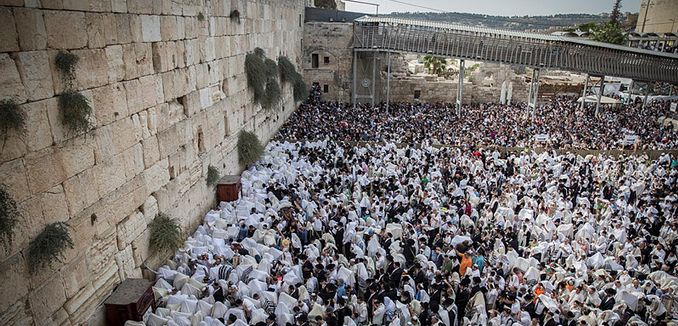If Palestinians want peace with Israel, they will have to stop denying Jewish history and “accept the historic tie and sacred nature of the Temple Mount for Jews,” a former State Department official wrote in an op-ed published Tuesday in The Washington Post.
Yehuda Mirsky traced the roots of Palestinian denial of Jewish history to Haj Amin al-Husseini, the former Mufti of Jerusalem, who in the 1920s “sought to Islamicize the political struggle with Zionism” as a means of rallying Arabs to the cause of nationalism. Thus, he would characterize seemingly innocuous Jewish actions, such as placing seats for worshipers at the Western Wall, as “part of a plot to destroy its sacred mosques.”
Currently, Palestinian leadership “has increasingly stoked fears about Jerusalem and the Temple Mount as a rallying cry to make up for the lack of secular national spaces and symbols,” just as the Mufti did before, Mirsky observed.
In addition to sowing the fears of a Jewish threat to Muslim holy places, Palestinian nationalists often deny the Jewish historical ties to Jerusalem and the Temple Mount. This has become a “central theme in Palestinian politics.” For example, Yasser Arafat explained to Bill Clinton that he couldn’t accept Israeli claims at the Camp David talks in 2000, because no Jewish temple ever stood on the site of the Temple Mount—a historically unsound claim.
Denying Jewish ties to the Temple Mount and Jerusalem is counterproductive to peace, Mirsky argued. He cited a poll stating that one-third of Israeli Jews who oppose a two-state solution would still accept one if the Palestinians acknowledged the reality of Jewish holy sites in Jerusalem and the West Bank.
This refusal to accept Jewish history has spurred Israel to “assert its own claims to the Temple Mount.”
International organizations that adopt the Palestinian denial of Jewish history, such as UNESCO, the cultural organization of the United Nations, push peace further away.
“Any hope for a sustainable future requires Palestinians to accept the historic tie and sacred nature of the Temple Mount for Jews,” Mirsky concluded. “Rather than denying Jewish history, Palestinians must instead construct secular political institutions and partnerships with the many Israelis who would be glad to maintain a peaceful status quo on the Mount for the sake of a livable Jerusalem. Absent this, the Palestinians will find themselves without Israeli partners, and peace, or even coexistence, will be ever harder to achieve.”
Mirsky and other experts have identified the Palestinian denial of Jewish historical ties to Israel as a major impediment to peace.
In an essay published in May of last year, Michael Mandelbaum, a foreign affairs expert at Johns Hopkins University, asserted that “at the core of the conflict, standing out like a skyscraper in a desert to anyone who cared to notice, is the Palestinian refusal to accept Jewish sovereignty in the Middle East.”
Max Singer, a co-founder of the Hudson Institute, similarly wrote earlier this year that the United States should adopt a strategy of truth-telling in its approach to Israeli-Palestinian peace talks in order to “undermine the Palestinian leadership’s efforts to deny basic historical truths that they would not be able to continue without embarrassing themselves before their own people.”
[Photo: Hadas Parush / Flash90 ]




